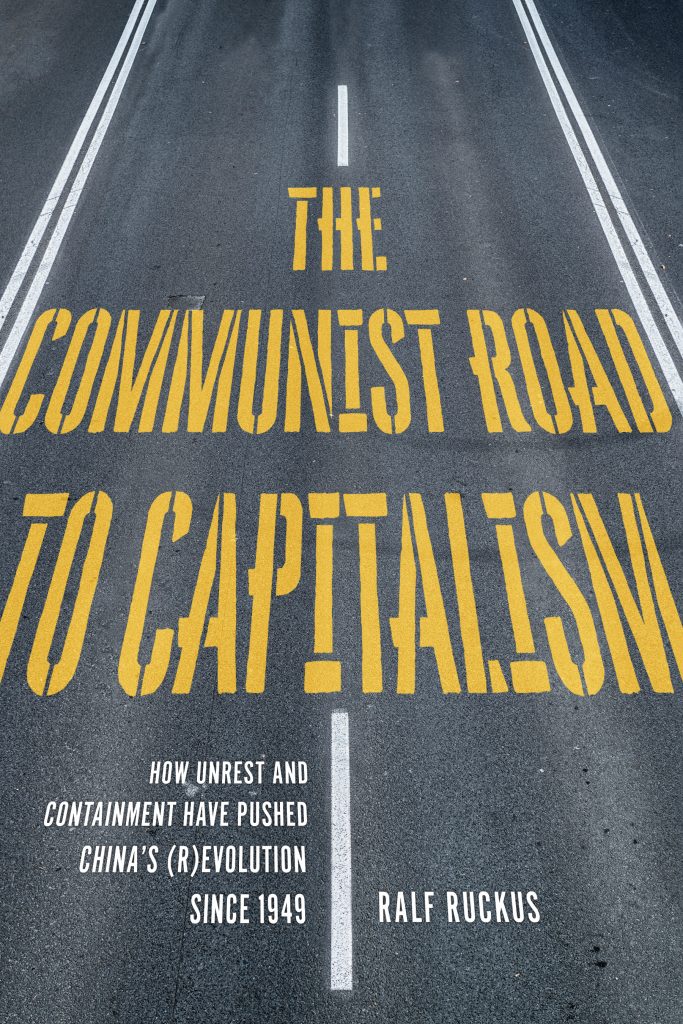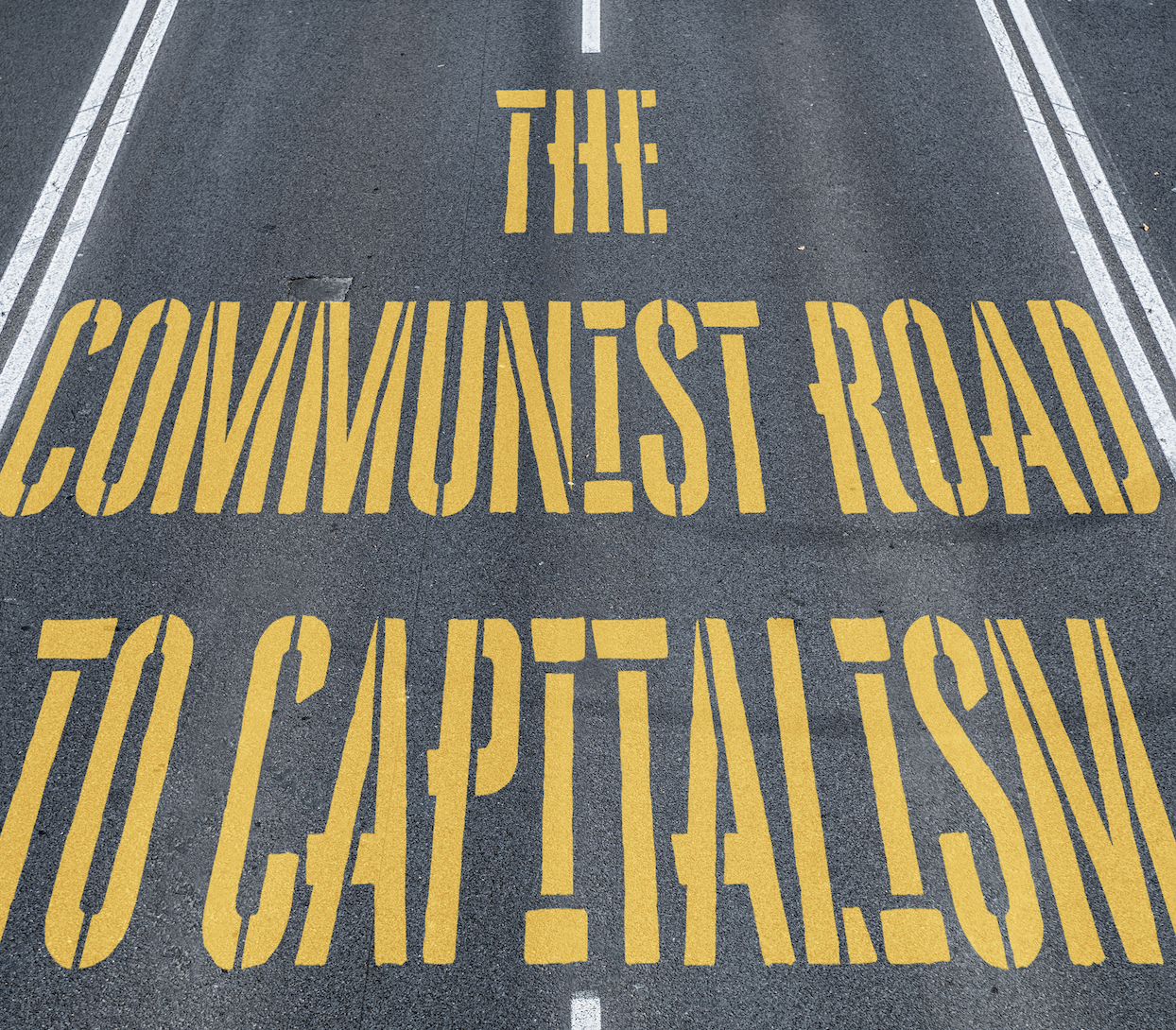Ralf Ruckus is the author of The Communist Road to Capitalism: How Social Unrest and Containment Have Pushed China’s (R)evolution since 1949 (2021). He has long been active in movements from below in Europe and Asia and publishes texts on social unrest in China on gongchao.org and nqch.org. This interview was conducted in the late summer of 2021.
How would you like to introduce yourself?
I got involved in political and social struggles in the 1980s, from punk to squatting, anti-war, and later labor movements. My life journey since brought me in touch with such movements in Western Europe, Eastern Europe, North America, and Asia. I am grateful for everything I learned on the way, but my general attitude towards life and struggle has not changed much.
How did you come to be interested in studying China?
It was actually not about “studying” the country but about getting involved in the debates on social struggles and, if possible, in the struggles themselves. That was just after the turn of the millennium. Throughout the 1990s, China had become the center of global manufacturing in new special economic zones, while the Communist Party regime dismantled the old socialist industrial base at the same time. These processes led to the formation of a new migrant working class and the unmaking of the old urban state working class. In Western mainstream media I heard and read about the waves of labor struggles these processes triggered.
At the time, neither I nor my comrades (and, actually, nobody I knew in left-wing circles in Europe and North America) had any contacts to workers or activists in China, so we had only a faint idea about the actual composition of workers, the gendered labor regime, the discrimination of the migrant workers, and so on.
That’s when I decided to study Chinese so I could go to China and establish links with workers, migrants, feminists, and other activists there, learn about what is going on, and take part in debates and struggles if possible.
Why should non-Chinese revolutionaries pay attention to Chinese history and politics?
Actually, I am careful with using the designation “revolutionary” because only after a revolutionary change has already occurred we might be able to estimate whether we were able to contribute something substantial. Many people who use the term are, in my view, not likely to contribute much as they promote elitist, paternalistic party concepts, for instance. But why should people who want to contribute to overcoming capitalism, patriarchy, and all forms of discrimination look at what is going on in China?
To keep the answer short, let’s just take two angles: the global composition of capital, and the global composition of the working class. China is not (and might or might not become) the center of global capitalism, but has been the center of global manufacturing for the past twenty years. Its state and private capital has not only grown rapidly in the past decades, it is also in many ways intertwined with capital in other countries and world regions with whom it has both common interests and conflicts over economic resources and geopolitical interests. That is having a big impact on the development of global capitalism, and we should learn about it.
The working class in China, meanwhile, has been recomposed in the past decades, both by industrial restructuring, relocation, and investment shifts between industries and regions and by dynamics of labor unrest and regime countermeasures. The workers’ struggles and their effects (such as rising wages), again, have an impact on the living conditions of proletarians around the world, and workers in China should be seen as allies in the struggle against capital globally.
In contrast to analyses on both the Left and Right that see the PRC as having one political-economic system since 1949—whether called socialism, communism, capitalism, or state capitalism—your book builds on another common rubric which sees a fundamental shift from socialism to capitalism in the late 1970s and 1980s. Further, your book emphasizes the need to distinctly include the transitions into socialism and capitalism in the periodization of PRC history (i.e. transition to socialism, socialism, transition to capitalism, capitalism). Why is this important?
For me, it is important to recognize ruptures and continuities in the trajectory of the PRC since 1949 in order to understand how and why the country has changed dramatically in the 1950s and in the 1980s/1990s, the two transitional periods.
While actually existing socialism before 1978 shared some features with capitalism, the two systems showed clear differences regarding the economic and political institutions and practices, the composition of social classes, the forms of struggles, and so on. So why would we use just one term, whether socialism or capitalism, for the whole history of the PRC?
Recognizing the transitional periods, both to actually existing socialism (that started in the mid-1950s) and to capitalism (that began in the mid- to late 1990s), is important to show that the system change did not happen over night and was contested by struggles from below and that it was shaped by countermeasures and reforms from above.
Throughout your book, you make space to look specifically at the question of gender and patriarchy in relation to the historical period you are writing about. Why is this important? How do you see the relationship between gender and class?
I don’t think that gender relations and class relations are separable, and if one tries to describe just one of them then the picture remains incomplete. So I try to look at the social composition in the PRC at a certain historical point from the gender angle and the class angle.
Actually existing socialism and capitalism are both resting on gendered forms of (social) reproduction. I want to understand the dynamics of women*’s struggles1 as part of social struggles of workers or migrants and how they challenge existing power structures and practices of exploitation, repression, and discrimination.
Maoism is often credited with helping Marxists take subjective forces and human will seriously as factors in social developments, against a strict emphasis on objective forces or conditions. In your work, how do you balance a materialist attention to structural contradictions as motors of history with an emphasis on the agency of people to make change?
I think we need to make two separations: Firstly, what Maoism promised in terms of mobilizing social resistance and creating a communist society is miles away from what it actually produced in the PRC, namely new class divisions, a repressive state system, and a reconfigured patriarchal order; and secondly, how Maoism was experienced in the PRC from the 1950s to the 1970s is very different from how Maoism was understood and promoted outside the PRC, especially in the 1960s and 1970s when it had a huge influence on left-wing movements around the globe.
Within the PRC, subjective forces and human will of the so-called masses did not play as big a role as, for instance, Maoist literature might suggest. In fact, the CCP leadership mobilized the masses in campaigns but mostly in a very controlled manner and within strict limits, and when mobilizations got out of hand, as during the Cultural Revolution, they were suppressed brutally.
Outside the PRC, the subjective emphasis was so attractive because it was useful for the mobilization of subversive movements against the capitalist system or bourgeois, feudal, or colonial structures. However, the groups and parties influenced by Maoism mostly did not manage to overcome the Stalinist part of Maoism, the vanguard party form, the separation of economic and political struggle, the reduction of anti-patriarchal struggles to a so-called side-contradiction, and so on.
The question on the balance between materialism and agency is a practical and not a conceptional one for me. Structures limit agency, agency changes structures. How and to what extent those two processes happen depends on the specific structures and actors at a certain historical point. So I try to grab those two processes, the structural confinements and the forces of social agency, in each specific historical narrative of social struggles from below and countermeasures from below.
There is a tendency on the part of both supporters and opponents of the CCP to tell the history of post-1949 China via the words of its elite leadership and, relatedly, to treat social conflict as identical to or flowing from power struggle within the ranks of the Party’s upper echelons. How ought those of us analyzing post-war Chinese society and politics relate to these pronouncements and factional struggles? Can you talk about your approach and how it differs from this focus on prominent, powerful individuals?
That is a very important point! For me it seems obvious that left-wing historiography needs to focus on the situation and struggles of proletarians, women*, workers, or migrants and their movements, so I tried to do that. However, I have come across books that describe the PRC’s political economy in particular periods by looking at what Mao Zedong wrote at the time and how others in the party leadership responded. I am not saying that we should not look at what powerful leaders say or write, but we should not just believe it and neither should we mix it up with what actually happened.
Regarding factional struggles, I think it is important to recognize the different interests and concepts behind factional conflicts within the leadership, just as we need to understand conflicting interests of capital or political factions in other countries. A problem arises when left-wing observers of these factional conflicts in the leadership of the CCP take the side of one of those factions because they think they were “leftists” or even “ultra-left,” as during and after the Cultural Revolution. We need to take these descriptions as “leftist” with a grain of salt as such allegedly left-wing factions are part of an authoritarian and exploitative regime.
Western media has made much of Xi Jinping’s August 17 speech at the tenth meeting of the Central Finance and Economics Committee, where he spoke of the need to “clean up and standardize unreasonable income, rectify the order of income distribution.” What do you make of the recent re-emphasis of “common prosperity” in CCP media and the seeming attempt to crackdown on the wealthiest in China? Is a return to socialist wealth re-distribution under the CCP a possibility?
Just to make that clear, economic and social inequality existed during actually existing socialism as well, not just in terms of wages or income differences but also in the access to certain types of housing, transportation, education, health care, and so on. Second, whether in actually existing socialism or in capitalism, wealth re-distribution is in itself not undermining exploitative social relations or the foundation of the economic system, quite the contrary, it can help the ruling class to defuse social tensions, mute social crises, and even stimulate the economy (through higher consumption).
That is how I read the current CCP leaders’ talk about “common prosperity” and the current so-called “crackdown” on a few wealthy people in the PRC. The party leadership is concerned that it will lose even more legitimacy among Chinese people if it does not publicly address the question of inequality and reign in some of those who show and celebrate their wealth. It also wants to prevent certain private capitalists, like those who own the quasi-monopolies in the tech sector, to gain more power. This is not the start of a socialist renaissance, it is just part of the regime strategy designed to deal with economic problems and social unrest.
Therefore, after Xi’s speech on “common prosperity,” CCP leaders used the official news agency Xinhua to underline that Xi’s comments had nothing to do with egalitarianism and that “the rich” did not have to worry that their property would be confiscated (http://www.news.cn/english/2021-08/26/c_1310150532.htm).
Is there still a left faction of the CCP?
There are tendencies and actors in the CCP which are indeed “left” in some sense, and there are tendencies and actors in the CCP which just appear to be “left.”
The actual leftists are Maoists or Maoist “loyalists” who have stayed in the party as they still hope it will return to a course reminiscent of the time of actually existing socialism. In the late 2000s, many supported Bo Xilai, CCP head in Chongqing, who mixed capitalist policies with welfare measures and Maoist folklore before he was purged by the party leadership in 2012. Many of the Maoist “loyalists” are promoting the support of workers’ interests and are in some sense anti-capitalist, but they also endorse authoritarian rule and promote PRC nationalism, for instance, by supporting the official policies regarding Xinjiang, Hong Kong, and Taiwan. Despite this, I still call them leftists, as I think it makes no sense to ignore that the left in the PRC and elsewhere includes such authoritarian and nationalist tendencies.
Those who just appear to be “left” are CCP leaders who, like Xi Jinping, refer to Marx as the author of scientific economic theories and to Mao as a national hero who liberated China from colonialism and imperialism, in both cases by stripping Marx and Mao and their related -isms of any subversive or class struggle related meanings.
The CCP regime as such is clearly right-wing. That is evident if we look at its politics, its suppression of workers’ struggles and organizing, its Han nationalism and racist suppression, its persecution of feminists and patriarchal biopolitics, and so on.
How likely do you think an end to CCP rule is? What do you think the greatest challenges to the Party’s continued governance are?
Currently, it does not seem very likely that CCP rule will end any time soon, and even if it were to falter, who knows whether the next regime would not be as bad or even worse? That might be the case, at least, if no strong left-wing movement emerges that is able to use any phase of instability to kill off capitalism and patriarchy, in China and elsewhere. At the moment, no such strong movement exists. The last wave of repression weakened left oppositional groups, and although strikes and other forms of worker unrest continue to produce pressure from below, they are not crystallizing into larger labor movements.
However, economic crises, demographic problems, geopolitical conflicts, and environmental disasters all threaten political stability, and as soon as cracks appear in the system, the resistance of workers and women* could increase and produce change. After all, in the history of global capitalism, strong social movements and class struggles before developed out of dark and repressive periods and without the left expecting them, for instance, in the 1960s. The PRC was a center of contention and struggle back then, and it might be a center again next time this happens.
Notes
1 From The Communist Road to Capitalism: “The gender asterisk (*) following women serves as a reference to the constructed character of gender. Going beyond binary and heterosexual gender concepts, women* refers to all who are described as women and all (trans*, inter*, or queer*) who intentionally choose a femme-like gender expression. Men with an asterisk (*) is used for a similar reason, while keeping in mind that cis men are not to the same extent subjected to patriarchal violence and oppression in capitalist (and socialist) countries as women*”







